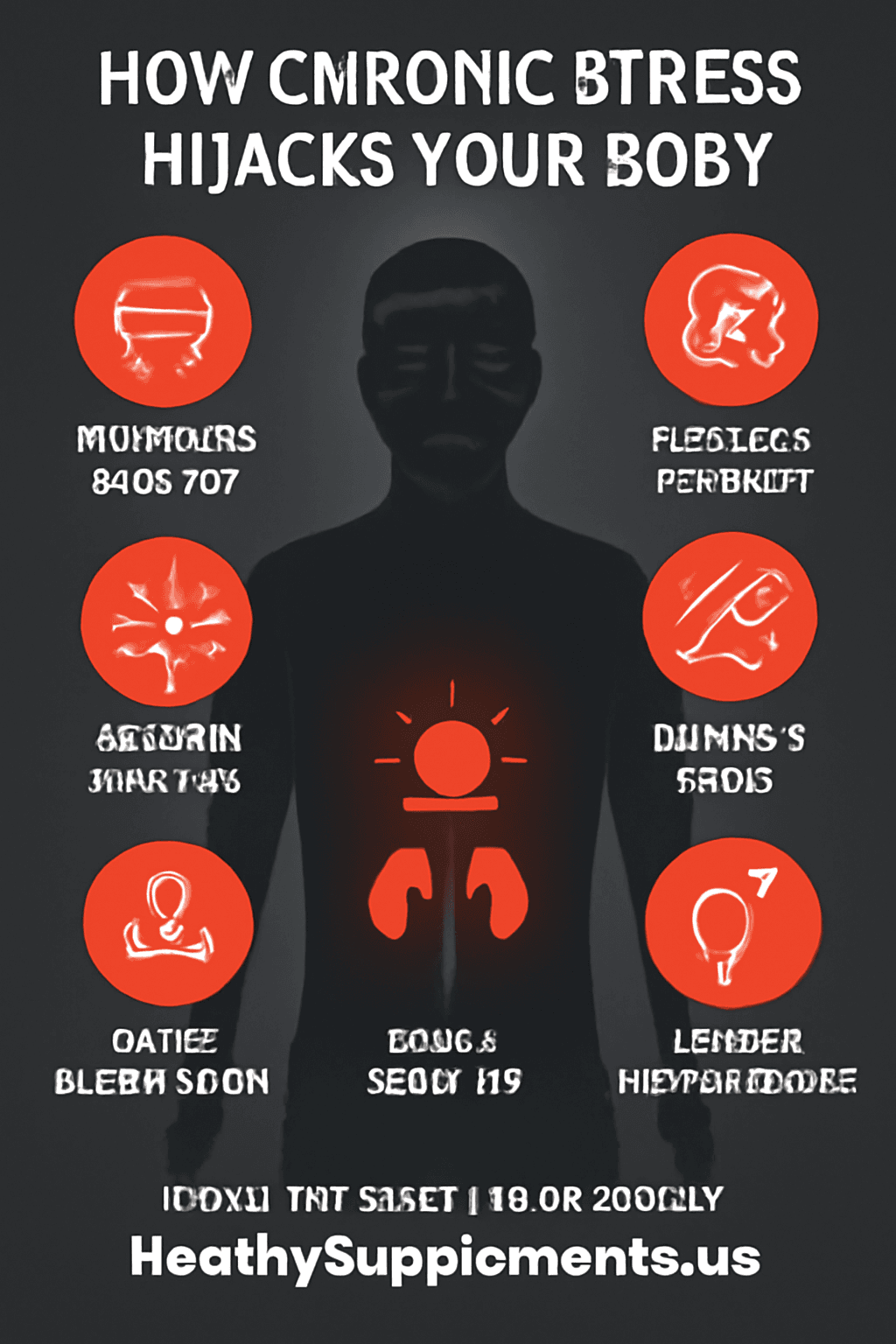
Infographic revealing seven ways chronic stress keeps cortisol high and damages key body systems—from belly fat to weakened immunity.
How Chronic Stress Affects Cortisol: 7 Dangerous Effects
Key Takeaways
- Chronic stress isn’t just a feeling; it’s a physiological state that disrupts your body’s hormonal balance.
- The primary way **chronic stress affects cortisol** is by keeping levels of this hormone dangerously elevated.
- This disruption can lead to severe health consequences, including weight gain, weakened immunity, poor sleep, and cognitive decline.
- Understanding these effects is the first step toward taking proactive measures to protect your health.
- A combination of lifestyle changes and targeted adrenal support can help you regain control.
What’s Inside This Article?
The Problem: Your Body’s Alarm Is Stuck “On”
>>You know the feeling: the constant pressure, the never-ending to-do list, the feeling of being perpetually overwhelmed. This is modern chronic stress. But what’s happening inside your body is far more than just a feeling. Your internal alarm system, governed by the hormone cortisol, is stuck in the “on” position.<<<
As we covered in our guide, what is cortisol, this hormone is vital for short-term survival. However, the way **chronic stress affects cortisol** regulation is profoundly damaging. Instead of rising and falling in a healthy daily rhythm, your cortisol levels remain consistently high. This constant hormonal pressure forces your body to operate in an emergency state, day in and day out, leading to burnout and breakdown across multiple systems.
7 Dangerous Ways Chronic Stress Affects Cortisol and Your Body
When your cortisol levels are always high, the consequences are far-reaching. Here are seven of the most significant ways this hormonal imbalance can impact your health:
- Promotes Stubborn Belly Fat: High cortisol signals your body to store fat, particularly visceral fat around your abdominal organs. This type of fat is metabolically active and strongly linked to an increased risk of heart disease and diabetes.
- Weakens Your Immune System: While short-term cortisol can reduce inflammation, chronic exposure suppresses your immune response. This makes you more susceptible to frequent colds, infections, and can slow down wound healing.
- Disrupts Sleep Patterns: The way **chronic stress affects cortisol** is by flattening its natural curve. High levels at night, when they should be low, can prevent you from falling asleep and staying asleep, leading to a vicious cycle of fatigue and more stress.
- Causes Brain Fog and Memory Issues: High cortisol can interfere with neurotransmitter function and has been shown to shrink the prefrontal cortex, the area of the brain responsible for memory and learning. This leads to the all-too-familiar feeling of brain fog.
- Accelerates Skin Aging: Cortisol breaks down collagen, the protein that keeps your skin firm and elastic. Chronically high levels can lead to premature wrinkles, thinning skin, and a dull complexion.
- Increases Blood Sugar and Insulin Resistance: By constantly pumping glucose into your bloodstream, high cortisol can lead to elevated blood sugar levels and, over time, insulin resistance, a precursor to type 2 diabetes.
- Suppresses Testosterone Levels: The body prioritizes the production of cortisol during stress, often at the expense of other hormones like testosterone. This can lead to low libido, decreased muscle mass, and reduced energy in men.
The Solution: How to Break the Cycle of Stress
Recognizing how **chronic stress affects cortisol** is the critical first step. The next is to take action. Breaking this harmful cycle requires a multi-faceted approach to support your adrenal health and promote hormonal balance.
- Active Stress Reduction: Incorporate daily practices like meditation, yoga, or even simple deep-breathing exercises to calm your nervous system.
- Prioritize Restorative Sleep: Create a strict sleep schedule and an optimal sleep environment to help your body reset its natural cortisol rhythm.
- Nutrient-Dense Diet: Focus on a diet rich in anti-inflammatory foods, magnesium, and B vitamins to provide your body with the building blocks it needs to cope with stress.
Targeted Support for Adrenal Health
For many, lifestyle changes alone aren’t enough to break a deeply ingrained cycle of chronic stress. This is where targeted nutritional support can make a significant difference. Using a high-quality adaptogenic supplement can provide your body with the specific compounds needed to modulate the stress response directly. For example, a clinically-backed formula like **CortiSync** uses patented Sensoril® to help lower cortisol levels, providing a direct intervention to support your efforts and help you feel better, faster.
Discover How CortiSync Can Help Break the Stress Cycle
To explore a full range of options, see our comprehensive guide to the best supplements for cortisol.
Frequently Asked Questions
How does chronic stress affect cortisol levels?
Chronic stress disrupts the body’s natural cortisol rhythm. Instead of peaking in the morning and falling at night, cortisol levels can remain consistently high, leading to a state of constant physiological stress and adrenal strain.
What are the long-term effects of high cortisol from stress?
Long-term, the way chronic stress affects cortisol can lead to serious health issues, including increased risk of heart disease, weight gain, suppressed immune function, digestive problems, and mental health disorders like anxiety and depression.
Can you reverse the effects of chronic stress on cortisol?
Yes, you can. By implementing stress management techniques, improving your diet and sleep, and using targeted adaptogenic supplements, you can help your body regulate cortisol production and mitigate the negative effects of chronic stress.
These statements have not been evaluated by the Food and Drug Administration. This product is not intended to diagnose, treat, cure, or prevent any disease. Results may vary. Always consult with a healthcare professional before starting any new supplement regimen.
Last reviewed: July 2025






